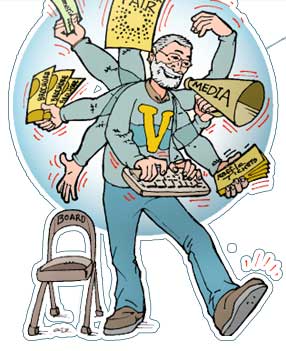








Mandela – Hero for the World
Brandon Sun “Small
World” Column, Monday, July 8 / 13
Zack Gross
Zack Gross
It doesn’t seem to have been that long ago when I, as a university student in Winnipeg, along with friends such as current fellow Sun columnist David McConkey, demonstrated in front of Manitoba liquor stores in the early 1970s to protest the sale of South African Paarl brand wines. We also did similarly at local Safeway stores in those days which sold South African Outspan brand oranges.
What led to our protest was the South African regime’s Apartheid policy, which translates as “separation,” but actually meant poverty and oppression for black people in that country. The white supremacist government relegated black people to ghettos in the cities and shanty towns in the country, saying that the two races shouldn’t mix. They set up a system of passbooks to regulate the movement of blacks who basically lived in a 20th-century slave system.
Any protest from blacks meant jailings, beatings, murders – including the most infamous incident, the 1960 Sharpeville Massacre, where 69 blacks were killed, many shot in the back as they fled and many of them women and children, and 180 were injured. For us, demonstrating in the safety and freedom of Canada, we were eventually pleased to see our government support a global boycott and help to force out the Apartheid Regime in the early 1990s.
Nelson Mandela, who at this writing lies near death at almost 95 years of age, was born in South Africa, became active in the anti-Apartheid movement in his twenties, and was an active opponent of the regime as a leader of the African National Congress (ANC). Coincidentally, Mandela’s real African first name commonly translates as “troublemaker” and certainly he was seen that way by white supremacists. “Nelson” was a Christian or “anglo” name given to him by his pastor.
Mandela lived his early life in poverty as his parents had lost their land in a dispute with the local colonial magistrate. His father then died when he was only nine. However, he was adopted by a local chief and ultimately was the first in his birth family to be able to attend school. At his coming of age ceremony at sixteen, the chief spoke of the frustration and sadness that black South Africans felt as white men controlled their land and black people had little to do but perform mindless chores for the minority rulers.
As the adopted son of a local chief, Mandela was able to attend college and study toward becoming a clerk, about as high as a black person could rise in those days. When college students protested the poor food and lack of say they had at school, Mandela as a student representative sided with them and was expelled for the year. He eventually settled in Johannesburg, took courses by correspondence and began to study law.
As a member of the ANC, Mandela joined a youth faction that believed they must go beyond polite petitioning toward civil disobedience. He was involved in numerous campaigns of defiance of racist laws but these were all non-violent. He also founded a law firm with his friend Oliver Tambo (another future South African President) and the two defended unrepresented blacks in court at low cost. In 1956, Mandela was arrested for treason but was acquitted. Meanwhile, young blacks were moving toward more militant action and he ultimately followed them.
Mandela served two prison terms for organizing national strikes and for sabotage, in 1963 being sentenced to prison for twenty-seven years. He became a symbol of the black struggle, surviving tuberculosis and a plot to murder him. After several failed attempts in the 1980s to get Mandela to renounce the black struggle, the South African regime finally released him in 1990 and unbanned the ANC. Then, after years of negotiation and tension, South Africa held its first democratic elections in 1994.
Mandela and South African President de Klerk received the Nobel Peace Prize in 1993 and the following year Mandela became President and de Klerk his first deputy. The next five years were spent trying to bring the two races together as much as possible to build the nation, to establish a strong central government and to enshrine minority human rights. Of course, many whites left the country throughout the course of these “troubles,” but South Africa is now an economic and political leader in Africa and in the developing world, despite continued challenges with poverty and violence.
After retiring from politics in 1999, Mandela spent many years raising funds for development projects, writing several books, and convened numerous conferences and campaigns on peace, women’s equality and democracy. His birthday (and my oldest son’s), July 18th, was declared in 2009 to be Mandela Day, an international day to celebrate and act upon his legacy. Recently, in response to Mr. Mandela’s failing health, US President Barack Obama declared him “a hero for the world”.
Nelson Mandela rose from poverty, fought for his people, and ultimately worked for reconciliation and prosperity for all. We wish him peace.
Zack Gross works for the Manitoba Council for International Co-operation (MCIC), a coalition of more than 40 international development organizations.
* * * * *
Return to Articles page
Return to Articles page